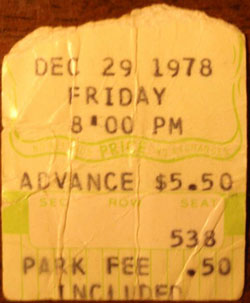Five men in spacesuits plug into your ‘Devo’
By Eric Siegel (The Baltimore Sun, 1/7/1979)
Jerry Casale, Devo guitarist and chief spokesman, paused between bites of a shrimp cocktail and sips of white wine in the dining room of the Pikesville Holiday Inn to ponder the question: How did the group begin wearing the yellow nylon space suits that have come to be one of Devo’s principal trademarks?
“Well,” Casale began with a perfect deadpan, “always being conscious of the latest fashion…”

Jerry Casale dined on a shrimp cocktail much like this one in the dining room of the Pikesville Holiday Inn.
Welcome to the wacky world of Devo, the latest swell in the waves of new wave bands, encountered on this night before its sold-out performance at Painter’s Mill Music Fair the Friday before New Year’s.
Devo generates a large dose of power pop and is sparked by more than a touch of pure put-on. Though Devo’s music is not without a message, the group generally comes off of as a kind of rock equivalent of “Saturday Night Live’s” Not Ready For Prime Time Players, with its manic energy and bent for satirization.
Even the group’s name, which members say is short for de-evolution, and music, which they describe as the sound of things falling apart, contain a suggestion of parody.
Old movies
And there is the group’s show. It begins with a brief movie of old footage of dancing fans with Devo singing “Come Back Jonee” in an effective lampooning of rock idolatry. It then moves to Devo’s staccato remake of the Rolling Stones’ “(I Can’t Get No) Satisfaction” and ends with the group singing “Jocko Homo,” with the catechism, “Q: Are We Not Men? A: We Are – Devo,” which is the title of their debut LP, to a room full of people in surgical masks and gowns.
At the end of the movie, the five-member group — three guitarists, a drummer – and a synthesizer — appear on stage. shouting “We are Devo!,” jerking around as if they had boards strapped to their backs and snapping their heads sideways on every backbeat.
After running through songs like “Praying Hands,” “Uncontrollable Urge” and “Mongoloid” that form the core of their lament against the strictures of industrial society, they break into a live version of “Jocko Homo.” Halfway through the number, they rip off their nylon space suits and toss them to the audience, an apparent satirization of Elvis Presley’s habit of tossing scarves to his fans. They finish the performance in black underclothes with matching red shin’ and elbow guards and red helmets, looking like some strange clones of Gestapo storm troopers.
Casale and Mark Mothersbaugh, synthesizer and vocalist — who, like the others in the group, are natives of the Akron (Ohio) area — began putting their show — and music together at Kent State University in the early Seventies, where both had gone to study art. They became fans of, among others, John Waters, Baltimore underground filmmaker.
“Our influences were less strictly musical than other bands,” Mothersbaugh explained. “We were probably influenced more by Ronald McDonald and John Waters than by Mick Jagger and Eric Clapton.”
What makes Devo run
Indeed, what Casale says about Waters may give more of a clue to what Devo is all about than anything he says about the group’s music. Casale says he is particularly drawn to the way Waters “deals with serious things on a nightmare, surreal level. As with Waters, Devo works from the imagination.”
What comes out is not without merit. The opening guitar runs on “Uncontrollable Urge” and “Mongoloid” show some real musical talent. And “Shrivel-Up,” which closes their album, may contain one of the best two-line summaries of the hew-to-the-line philosophy of the Seventies: “It’s at the top of the list/That you can’t get pissed.”
Devo’s remake of the Stones’ “Satisfaction” is also worthy of note for reasons that have nothing to do with the kinky effectiveness of the interpretation. For one thing, it serves to separate the group from such punk rockers as Johnny Rotten. who has criticized Jagger for becoming too fat in his ways and too soft in his music. For another, it points up the group’s elemental perception of the world. “Here it is almost 1980,” Casale says, “and you still can’t get no satisfaction.”
Yet at other times the group seems fascinated by its ability to produce lyrics that are nonsensical, as in “Jocko Homo,” and sounds that are so over-synthesized they cease to be music. The latter is the case on “Too Much Paranoias” (sic), which contains some of Devo’s best lyrics but sounds like it was made to be the soundtrack for Star Wars II.
That, coupled with the strange attire and onstage antics, inevitably inspire the suggestion that Devo is strictly a gimmick group that shouldn’t be taken seriously, despite increasing attention that includes a highly successful European tour, a recent appearance on “Saturday Night Live” and mention in People magazine’s 1978 year-end issue.
Don’t want MOR
“Actually, I wish people would regard Aerosmith as tongue-in-cheek,” Casale said. “Why they don’t point up what’s happening. All the Seventies are is a bunch of people who have lost it and stayed around. MOR [middle-of-the-road music] is the big sleep of the Seventies.
“We got to the point where we couldn’t stand the music that was being made so we decided to throw our hat into the ring, We took the attitude that what we were doing was legitimate and we would put it out there.
“We are the band that does the things that haven’t been done before — in music and in our stage shows. There’s something in our music that strikes a level in people they connect with.”
Asked what that level was, Casale paused between another bite of his shrimp cocktail and sip of white wine to ponder the question.
“It’s the Devo in everyone,” he dead-panned.
Related Links


